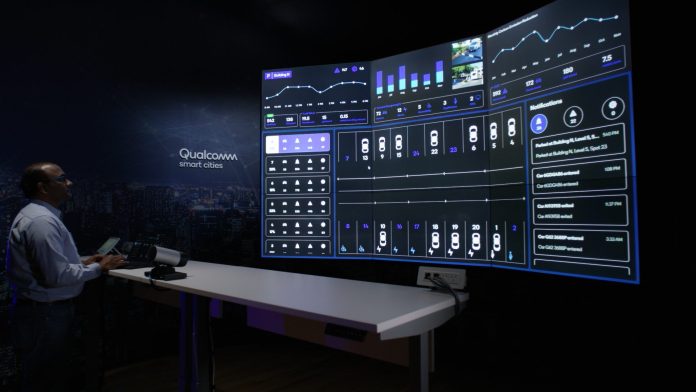Qualcomm has said its smart cities accelerator project has expanded to over 400 members. Industrial 5G system integrator Booz Allen Hamilton, which works with the US military and government, is among the new joiners. Meanwhile, Qualcomm said its IoT services suite has expanded to cover more than 30 vertical industry segments since launching about a year ago, and now comes with enhanced platform features to deliver additional capabilities.
Booz Allen Hamilton is working with Qualcomm, and other accelerator members, to provide 5G mission-critical 5G applications and use cases across the public sector in the US. The Virginia-based firm will work as a system integrator for ecosystem members in the, said Qualcomm. The partnership addresses the supply of machine vision technologies, including “AI cameras”, for smart marine bases and naval fleet carriers.
Chris Christou, a vice president at Booz Allen Hamilton, and leader of the firm’s 5G and secure cloud practice, said: “We are pleased to work with Qualcomm on additional opportunities for 5G applications in the public sector… Together with Qualcomm, we can integrate comprehensive 5G solutions and services to enable smart connectivity and integration in the public sector.”
Qualcomm’s smart cities accelerator, launched in April 2019, seems to bring together sundry tech providers – system integrators, hardware and software providers, cloud solution providers, design and manufacturing companies – to combine variously on Qualcomm-based as-a-service smart solutions for “modern cities, spaces, and enterprises”. These solutions are indexed and offered as part of Qualcomm’s IoT services suite.
Other new accelerator members include asset management firm JLC Infrastructure, focused on the transportation, communications, energy, and utilities sectors, and IGNITE Cities, a tech consulting practice supporting city mayors in the US. Alongside these tech providers, the mayors of San José in California, St Louis in Missouri, and Miami in Florida came out to show their support at the accelerator event this week.
Qualcomm’s IoT as-a-service (IoTaaS) model is supposed to remove the need for investment in “costly and fragmented efforts”. It stated “Adopting IoTaaS enables streamlined, end-to-end solutions, taking the place of lengthy processes that previously took months or years and can shrink timelines to a matter of weeks. Ultimately this supports [faster] rollout… and increased accessibility to smart solutions and infrastructure.”
The offer has expanded beyond the traditional public-sector cities space, to incorporate sundry adjacent verticals, and to offer a way for enterprises IoT users to monetize their smart solutions, claims Qualcomm. Its enhanced IoT platform includes low-code IoT app development, drag-and-drop IoT app deployment, automated IoT device onboarding and management, streamlined IoT device configuration, and integrated operating procedures workflow.
Among the new vertically-geared as-a-service IoT apps, Qualcomm is offering: a drone-based inspection tool for construction firms to detect incidents on site, and for first first responders to offer emergency support; an asset management bundle for supply chain tracking, compliance, and efficiency; traffic management for cities to control and adapt traffic signals and flows; and a lidar-based smart venues app to support safety and security systems.
Sanjeet Pandit, senior director, business development and global head of smart cities at Qualcomm, said: “To address the fragmented nature of the IoT industry, our IoT Services Suite is bridging the gap for IoT service providers and entities looking to… deploy smart solutions. The offering has grown beyond our expectations, and we are proud of… the shift in mentality we have driven to meet the needs of smart solutions across multiple industries.”
Tal Kreisler, chief executive at NoTraffic, providing the new transportation bundle, said: “Working with cities and traffic agencies in the US and Canada, we see immediate improvements in their key metrics – delay times, CO2 pollution, safety, residents’ satisfaction. This collaboration gives us access to innovative technology on the one hand, and to strategic, mobility-focused initiatives on the other hand, generating a win-win-win scenario in the IoTaaS domain.”
Patrick Blattner co-founder and chief product officer at The Indoor Lab, providing the new smart spaces app, commented: “Given The Indoor Lab’s leading position for creating smart spaces using lidar, we see integrating with the Qualcomm IoT Services Suite as an evolutionary extension to scale, future proof, and deliver a safer experience for venues and operators with our Traffic Analyzer platform.”

